So, Father Jonah thank you very much for finding time to talk to us and I understand that you are right now in your parish church. I see those beautiful frescoes behind you and you just finished your, what is it? Soup kitchen work? Or a food pantry?
Right, yes. It is accurate that every Monday from 4:30 to 6 o’clock p.m. we operate our food pantry. Which ordinarily, we feed somewhere between 50 and 80 people per week. So, we’re the only food pantry, at least to my knowledge, that is open every week in Wayne County, West Virginia. This is an operation, an effort that we’ve been doing for around four years now or actually five years. It was five years; this past January was our fifth anniversary of operating the food pantry.
So, the purpose of the food pantry is obvious: we are in Appalachia. Wayne County, West Virginia is a, well we’re a poor town in a poor county in a poor state. You can put it that way and we have a very high percentage of people in our area that are all in some degree of support from the government. They receive food stamps. It’s hard to scratch out an existence here and this more or less created a scenario where there’s a tremendous need for food assistance. And so that we have had this larger question of what is our responsibility as an Orthodox parish in such a context? What is our responsibility as Orthodox Christians?
And then there’s the other question which every parish asks, how do we connect with our local area? Like how do we bring Orthodox Christians, not-Orthodox Christians but the non-Orthodox? How do we bring them to the Orthodox faith? And so, the food pantry has been an instrumental part in our approach to both of these questions over the last few years.
What you are describing resonates with what I saw in Lenoir City, Tennessee in Father Job Watts’ mission. When a person there sees clergy in our Byzantine attire a normal question raises: How would I relate to somebody who is like that? He is so different than me. Then things like a food pantry, they really help to understand that we belong to the same local context and know your pain. I understand that when you mention that this ability also to attract people, you didn’t mean that you are using this in any sense to convert them.
Yeah, well, this a backdrop to who we are as Orthodox Christians, I mean in our community, we probably are about 80% converts, 20% of the people are of Slavic origin, Ukrainians, and Russians. I myself a convert to Orthodox Christianity. We believe that we have found something that is deeply beautiful and true. And perhaps most importantly is, it creates a path for mankind to true freedom in a sense that what’s being offered to us in Orthodox spiritual life is freedom from the passions. So, I mean this is kind of a thing we talk about a lot in sermons and things of that nature. But if a man says that he wants to live a certain way, he wants to live a holy life, he wants to stop falling into this sin or to that sin. He finds by experience that he is trapped, well then, we have to come to that conclusion that we’re slaves, it’s a type of slavery. And so, what’s being presented to us in the church is freedom from that, is freedom from the passions, is a spiritual path which leads out of this position of slavery to a position of liberty.
So, it’s a natural instinct for Orthodox Christians to want to share their faith. And Orthodox Christianity and in North America, specifically in the United States, I mean we are very, very good at attracting a certain subgroup of Americans to Orthodoxy. It’s usually white, educated males, people that have some type of comparison, a background where there’s a degree of affluence. Usually which it creates a context where people can be educated and so we’re extremely good at attracting people who are interested in theology and learn about church history and they come asking deep questions.
Pretty common that prospective converts come to the church and they say that they’ve heard all about Father Seraphim Rose or they’ve read this book or that book about church history and they want to become Orthodox. And that’s fine, that’s of course, we have a place for those people. But the larger question is, how about everybody else? How do you spread Orthodoxy in a community where there is not that affluent backdrop to society?
Instead there’s poverty and there is a kind of a more closed culture, as you have in Appalachia where things that are foreign don’t really have a place in the local culture. And certainly, our parish is a parish of the Russian Orthodox Church, specifically the Russian Orthodox Church outside of Russia. If we branded ourselves with that and went around and told everyone, “Hey, we’re from the ROCOR church down the road, come and hear Church-Slavonic.” Or something, this would be extremely foreign to the majority of local people and so that’s really the big question for us that we’ve had to try to answer.
Are we going to content ourselves with just saying we’re gonna have converts come occasionally that are people of a very specific type who are interested in very specific questions, which we want them, we’re happy to have them of course, but I’ve put a lot of thought into this question and I think that you can kind of think of it like this, you can judge the success or failure or the Orthodox Church in properly enculturating, or properly spreading itself within a culture by examining the cross-section of the church and comparing that to the cross-section of society at large. In other words, if you take 100 parishioners, 100 people in the church and you say, we’ve got three doctors and two lawyers and four nurses and five people that work in factories and this many white people and that many black people et cetera. And then you compare that to the normal cross-section of society, are they the same? If they are the same then it means that we’re doing the work that we are being asked to do, we are finding a way to reach everyone. And if they’re not the same, then I really believe that brings up important questions that need to be examined. For example, I think if you look at the Orthodox church for example in Russia, I hear stories of people in prison. They have chaplains and chapels, Orthodox chapels in prisons, you have people that are wealthy, you have people, the upper end of society that come to church and you have the extreme poor that come to church. Because in the land, like Russia, Orthodoxy is the prevailing faith of that place. So that’s not what we have here and if you look at the efforts of the Orthodox Church to spread itself in the United States, North America, I feel like in some ways we’ve hit a wall. We don’t know how to go beyond just kind of the convert experience.
All of that being said, as you pointed out earlier, we don’t operate the food pantry as some sort of arm of, to proselytize people, to bring them. The main purpose of operating the food pantry here is precisely what we hear in the Gospel on the Sunday of the Last Judgment. Which is that the Lord is going to be holding us who are his followers, his disciples accountable for if we have fed the hungry and clothed the naked, and so forth. So that’s kind of how it all started in our parish, I mean I came here as the rector in 2011. And every year, as you’re preparing for Lent, you come around to the Sunday of the Last Judgment and you read that gospel. And you hear this is what we’re going to be judged for when we stand before Christ at Judgment. And the sheep are going to be on the right and the goats are going to be on the left and we’re going to be judged specifically against the question, how did we treat those in our midst that were struggling? So, my point of view is that this is not a question which is optional, like if it’s convenient, then we’ll do charity work. I mean I think it’s quite clear in the gospel that this is fundamental to Christianity, is having this kind of outlook.
For years I would stand up and read the Gospel on the Sunday of the Last Judgment but I don’t get to do it anymore cause now I have two deacons. So now I just get to listen to it, I don’t actually get to read it. But it just was a recurring theme in my thoughts that we have to do something. I thought about all the times that we had feast day celebrations for our parish feast day or Nativity or Pascha and we stand up and have nice speeches and congratulating everyone on the feast. And you look around and it’s the same people, it’s the same 50 or 100 people or however many.
Our church these days has around 65 people coming, well actually these days we’re in the middle of the Coronavirus pandemic so it’s considerably fewer people. But prior to the rise of the Coronavirus, we had around 65 people coming. So, every time a feast day comes around, you look around, there are 50 or 60 people and it’s the same people. And you have to ask yourself, is the church just kind of an ivory tower for people that already have Orthodoxy or are we going to do something else?
And so, it was our belief after years of thinking about this that we had to do something and so, and we also happen to exist in a community where there’s a tremendous need. I mean obviously, as we talked about previously if our church was in Palo Alto, California for example, where there probably aren’t a lot of poverty, it’s just too expensive to live there if you’re poor. Then perhaps having a food pantry would not make as much sense.
But we’re in Wayne County, West Virginia and there is a lot of poverty here and so we have to be the ones to respond to it. And so there are lots of aspects to it but I think every pastor of a parish comes to that point where you start asking questions about what is the purpose of this church and how are we going to grow? How are we going to have a future in this place? And I think for us, we’ve come to the conclusion that we are here in Wayne County, West Virginia, we have no plans to move anywhere else. And we have to be an active part of this community, which means on some level we have to be a church, which is making every effort to meet the needs of the local community.
Thank Father Jonah. Our Russian Church Abroad is known for continuing tradition of piety connected with Old Russia. We have a strong tradition of liturgical worship. At the same, the idea of the liturgy after liturgy did not put down roots among us. What you mentioned, referring to the Gospel of Matthew about the Great Judgment is not something that people, would oppose, but something that we don’t do on a regular basis, right? What would be your explanation about this?
I think there are lots of aspects of it, obviously the, one perhaps overarching aspect of it is the way that charity, in general, is treated in the modern world. Historically, it was the role of the church to serve those in society who were struggling with various needs. That role has more or less been taken over in modern times by the government and so people kind of have this idea now that if the church isn’t actively engaging in food pantry work for example, or helping with homeless people or wives for example who are battered or some type of help in society; well there’s the idea that there’s some other layer of our culture that’s going to handle that.
I don’t know for example how that’s handled today, in Russia, I imagine they have programs like we have here. But of course, in West Virginia, a very high amount, a very high percentage of the people are on food stamps which is a form of government support. So, they’re able to buy a certain amount of groceries each month because they don’t have a job or because their income is so low, they’re able with support from the government. And even our food pantry, ironically enough, a lot of the foods that we get out to people are foods that are subsidized by the US Department of Agriculture, the USDA.
So, we’re only able to even get those foods because there are programs through the government for example which make it free for us to get the USDA foods. There are other foods that we get which are kind of the near expiration date foods from large supermarket chains like Wal-Mart and Kroger and places like that. We’re able to buy foods which are nearing expiration date for an extremely inexpensive price.
This is also a tremendous blessing but still, a bulk of what we pass out are USDA foods, which are foods that are provided by the government. So, it’s kind of an easy thought to fall into when other people are doing the work, why should we do it? Or there are other organizations like IOCC, the International Orthodox Christian Charities. But where people fall into this mentality that they can just send a check, I don’t really have to be involved personally, I can support charitable efforts of other places. And of course, that’s good work to do that, I can’t take anything away from that whatsoever.
Especially if we go back to that example of maybe a church in Palo Alto or something like that, it perhaps makes sense because you don’t have that drastic need that’s right in front of your face. In our case, the need is right in front of our face. I mean we’ve had lots and lots of people come to us, even before we had the food pantry asking for help. Asking if we could buy some groceries for them or helping with this and with that. And as I shared with you before, from the time since we’ve offered the food pantry since it’s been open, we’ve gotten very, very close to quite a few of our patrons and that’s really opened my eyes. I think not only my eyes, but the eyes of all our parishioners who are involved in the food pantry to the needs that we have here.
I mean we’ve had numerous people that have died because of drug overdoses. I can’t tell you how common it is that people come to the food pantry and they ask me to pray for their son who’s in jail or can you pray for my daughter?
I mean we’ve had numerous people that have died because of drug overdoses. I can’t tell you how common it is that people come to the food pantry and they ask me to pray for their son who’s in jail or can you pray for my daughter? She’s a heroin addict. I mean almost every week that we’re offering the food pantry, people are telling me stories about things which are happening here in Wayne county. So, for us it’s not some faraway place that needs help. I also think and I don’t want to be too harsh in saying this but I mean the Lord did say that in the last days the love of many will grow cold.
And I think there is that kind of thing happening as well, our hearts have really grown kind of numb. The same kind of feeling that we have if we’re on the street if a homeless person comes up to us and asks us for a handout, most people kind of like, they clinch up and they want to avoid that person. They want to avoid that interaction with that person, they’re afraid that this person is going to maybe attack them. And I have those same fears, I mean I’m not above that by any means.
But if you contrast this with stories you would hear from the history of the Russian Church where, a person would grab a handful of coins and take them to church. Because they would be passing all the beggars and the homeless people that would be asking. So, they wanted to make sure that they would have a coin to give to at least every person.
But you can also hear about various efforts that the ancient church used to make even in the first few hundred years of her existence. There were, you hear about chapels but you also hear about places for people that were homeless and people that, places where people could be fed; the church was overseeing a lot of this type of work in ancient times in Christian culture. And nowadays that’s not so much the case, I think that all these factors just kind of come together and lead to what we see on the ground.
Thank you, thank you Father. So, my next question is about a recent article that appeared on the Internet and mentioned a monastery and a certain parish in your area of West Virginia. So, I haven’t studied this article, but what I’m assuming based on the ensuing discussion is that there was a perception about the sort of mixed loyalties for American converts. Sort of idealized Russia versus a contemporary America, portraying Russia as a bastion of Christianity. As a result of this portrait some people may assume that these converts are less loyal to their country. So, can you comment on this, please?
Sure, just the backdrop to that is we had a graduate student from NYU who is an Orthodox Christian and so she came and lived in our area for a year. And got to know us and interviewed quite a lot of us with the idea that she was doing some work on Orthodoxy in Appalachia and the understanding was that it was gonna be about the uniqueness of what we have here. We’re kind of a parish in an odd location, ordinarily, parishes in the Orthodox church thrive in big population centers and our church is exactly the opposite of that.
We’re out in the middle of nowhere in West Virginia. Even the nearby town Huntington, West Virginia, well there are a couple of Orthodox churches there, but it’s a small place and certainly very small in the Orthodox world. But the Hermitage of the Holy Cross is here and our parish was really founded in connection with Holy Cross Monastery back in 2002. So, the understanding that we had was that it was about that. And so, interviews were conducted and then this article appeared which as you say, kind of cast doubts on the loyalty of these converts to Orthodoxy in Appalachia. Almost implying that, as you say our loyalty was to a foreign power, to Putin and Russia or something like this. All I can really say in response to that is that’s not my experience at all. We have conversations about how the way things are today in Russia, I for one have traveled three times to Russia and don’t have any real illusions about the way things are there. I mean it’s primarily a secular country with plenty of problems of its own, internal turmoil, there are even problems in the church. So, my conclusion as the pastor of this community, is that there is no perfect place outside of heaven, which is what we are all looking forward to. But the big question comes especially in a place like Appalachia where there’s a strong emphasis on freedom, there’s a strong emphasis on the Constitution of the United States. I think more than anything if you were poll our people, they would say that they are patriots, they are American patriots, loyal to the Constitution.
And then it brings up some kind of other question about, well if you contrast what we see in the Constitution with the way things are actually on the ground today. Have we gone off the book a little bit? Are there examples where freedoms are being infringed upon? And certainly, I think a lot of people do have some kind of a feeling that to be a part of a traditional faith body in the year 2020, it’s kind of puts us in a class of our own. There are lots of popular opinions that are out of phase with what the Orthodox Church is teaching today.
So, it brings up a big question about what is the basis for our beliefs? Why are we Orthodox Christians? And if you go a step beyond this and I think this holds true for almost all the people that this graduate student interviewed. I think almost everyone would say if they were asked at least, that more than anything else they are citizens of heaven in the sense that what St. Paul says is that we have here no continuing city.
My personal point of view is I mean yes, I follow what’s happening in politics, I have some degree of understanding of what’s happening in the politics in Russia and other Orthodox lands; Ukraine and all over the world. But I try not to pay too much attention to that because spiritually speaking, this life is just, it’s very temporary. We’re only here for an extremely short time and as the beautiful quote goes from St. Isaac, this life is given to us for repentance. It’s not to try to build some kind of an earthly kingdom or to change politics in the direction of your guy, of your candidate, or whatever. All of those things are temporary and fleeting.
So, I can just say that I think that our people more than anything else want to try to live a holy life and they want their children to be able to be raised as Christians. It is a fairly common topic of discussion, what happens if the laws change in such a way that the Orthodox Church is penalized in some way for maintaining a traditional view of marriage? So those kinds of questions do come up from time to time, but I can just tell you, I don’t know a single person in our parish who is just, for example a complete Trump supporter. There could be people in the parish who voted for Trump but everyone’s views of all these questions of Putin, of Trump, of American politics, they’re all extremely nuanced. There are some things people like about Trump and there some things they don’t. There are some things they like about Putin and there are some things that they don’t.
It’s kind of an image of the way every human being is in a sense, we’re all a mix of good and evil and our people aren’t so dumb and Appalachian are not an exception. So, the conclusions that she reached, I think were to our people extremely insulting because they paint us with an extremely broad brush. They are kind of sweeping characterizations of the parish and don’t describe in their entirety any one person I know. Interestingly enough, I think that you could take maybe four or five people and combine their most extreme views into one person who doesn’t actually exist in real life. And say that some of those things that she included in the article might begin to take form in one theoretical person but in terms of actual people, it just seemed completely out of touch and out of phase with the way things are on the ground. And I guess that is the question, is this really anthropology and what’s hard science and what’s soft science?
I think first and foremost, this is a community of Orthodox believers. Who are to the best of their ability trying to be good citizens in this country, law-abiding citizens who have no foreign loyalties, absolutely not. But their first priority is to try to live this life in such a way that they’ll have a good defense before Christ in Judgment, that’s the only thing that’s important to us.
So, if she’s here for a year and she’s trying to draw conclusions, it’s entirely plausible that those conclusions may have been filtered through here own presuppositions or through some conclusion that she wanted to draw. Obviously even when you’re polling for example, the way you ask the question in a poll can drastically skew the end result and it certainly feels that there may have been some of that going on with people.
Asking questions about Putin for example to people that have never even really thought much about the person of Vladimir Putin in their life. Now all of a sudden, they’re being forced to answer the question while they’re being reported and they’re going to come up with an answer kind of on the fly that then goes into her thesis or whatever it is. So I don’t think that the reality on the ground is anything like what she characterized and the reason I’m saying that is because there was a tremendous amount of feedback from our parishioners who saw that article.
It spread through the parish like wildfire, my phone was ringing off the hook, my emails were coming in and people were commenting left and right on Facebook saying that this is not us. How dare you imply that this is who we are! But it’s too late, her ideas have already been put out there but I think first and foremost, this is a community of Orthodox believers. Who are to the best of their ability trying to be good citizens in this country, law-abiding citizens who have no foreign loyalties, absolutely not. But their first priority is to try to live this life in such a way that they’ll have a good defense before Christ in Judgment, that’s the only thing that’s important to us.
Fair enough, thank you so much, thank you so much, Father Jonah. That was most edifying and I’m very glad that we were able to make up for that interview that didn’t work out last October in Jordanville.
Conducted by Deacon Andrei Psarev

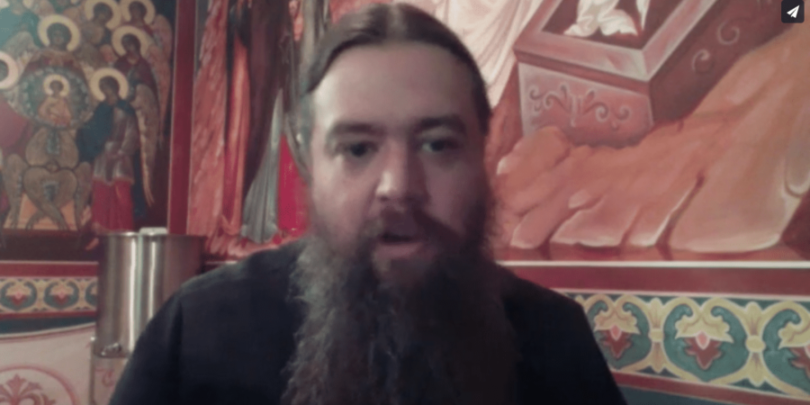


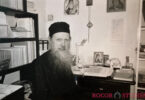

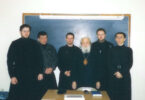
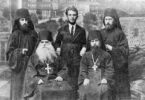
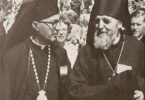
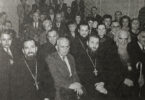
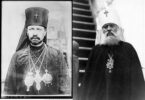
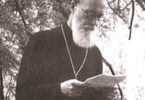
Fr. Andrei,
I believe Fr Jonah makes good points about the future of the Church, especially who we often attract.
I have heard Orthodox clergy and monastics speak before about attracting a more diverse group of people to Orthodoxy. I wonder if people were actually evangelized by using Orthodoxy’s heritage from the parts of the world that those we are evangelizing are from or their ancestors are from would help?
In the prisons, as a chaplain I would always bring to the low church baptist/Bible African American communities the lives of the saints from the African continent. We would also have literature and other media available for them to read and see what the truth is about their ancestry. It was always an enlightening experience.
In Christ,
deacon Joseph